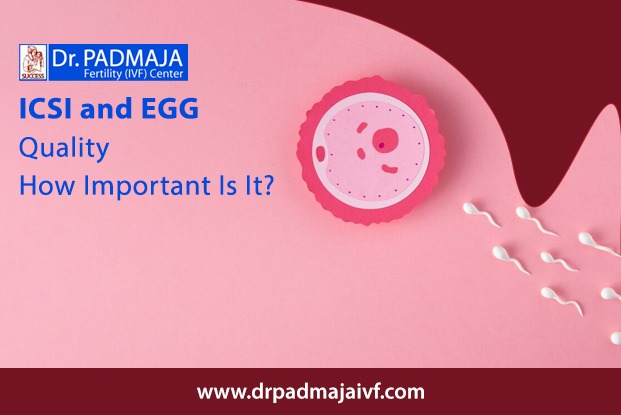When it comes to fertility treatments, Intra-Cytoplasmic Sperm Injection (ICSI) is a groundbreaking procedure that has revolutionized the chances of conception for many couples facing infertility issues. However, one critical factor that plays a significant role in the success of ICSI is the quality of the eggs. Understanding the relationship between egg quality and ICSI can help individuals and couples make informed decisions regarding fertility treatments. In this blog, we’ll explore the importance of egg quality in the ICSI process and how choosing the right fertility center, such as the best IVF center in Hyderabad, can greatly influence the outcome of your treatment.
What is ICSI?
Intra-Cytoplasmic Sperm Injection (ICSI) is a specialized form of in vitro fertilization (IVF) used when there are male infertility factors, such as low sperm count or poor sperm quality. During ICSI, a single sperm is directly injected into an egg, bypassing the natural fertilization process. This approach is particularly useful in cases where sperm cannot fertilize the egg naturally or when previous IVF cycles have been unsuccessful.
However, the success of ICSI does not solely depend on the sperm. The health and quality of the eggs are equally vital. Poor egg quality can significantly decrease the chances of fertilization and increase the likelihood of miscarriage, even with advanced treatments like ICSI. Therefore, it is essential to consider the quality of your eggs before opting for IVF or ICSI.
Why is Egg Quality So Important?
Egg quality is crucial because it directly impacts the embryo’s development after fertilization. The better the egg quality, the higher the chances of successful embryo implantation and pregnancy. Good-quality eggs have the ability to support the sperm’s genetic material and help it develop into a healthy embryo. On the other hand, poor-quality eggs may lead to abnormal embryos, resulting in failed implantation or miscarriage.
One of the main elements influencing egg quality is age. As a woman ages, the quality and quantity of her eggs decrease, which is why fertility experts often recommend treatment sooner for women over 35. However, other factors can also impact egg quality, including lifestyle habits, medical conditions, and genetic factors. Conditions such as polycystic ovary syndrome (PCOS) or endometriosis can also affect the quality of eggs, making it even more important to consult with a skilled fertility specialist.
How Does ICSI Address Egg Quality?
ICSI can improve the chances of fertilization in cases of poor egg quality, but it cannot overcome significant issues related to the egg itself. If the egg has a substantial amount of damage or genetic abnormalities, even ICSI may not result in a healthy pregnancy. However, for women with relatively good-quality eggs, ICSI offers a greater chance of fertilization, especially when combined with other advanced IVF techniques such as egg freezing or embryo genetic testing.
Fertility specialists typically evaluate egg quality using various factors, including the size and shape of the eggs, as well as their appearance under a microscope. These evaluations help determine the best course of action for each patient. This is where the expertise of a reputable fertility center, such as Dr Padmaja IVF Center or Drpadmaja Fertility Center, can make a difference.
Why Choose the Best IVF Center in Hyderabad?
Choosing the right fertility clinic plays a significant role in the success of ICSI treatments. The best IVF center in Hyderabad offers advanced technologies, experienced specialists, and personalized care that can improve your chances of successful fertility treatment. Dr Padmaja IVF Center, led by Dr. Padmaja, is one of the leading fertility clinics in Hyderabad, offering high-quality services for couples dealing with infertility. The center is equipped with state-of-the-art facilities and offers treatments tailored to each patient’s unique needs.
Dr. Padmaja, a renowned fertility expert, uses a patient-centered approach, ensuring that couples receive the most effective treatment based on their specific fertility issues, including egg quality concerns. Her extensive experience and commitment to patient care make Drpadmaja Fertility Center one of the top choices for those seeking IVF and ICSI treatments.
Conclusion
In summary, egg quality plays a significant role in the success of ICSI treatments. While ICSI can help bypass some fertility issues, it cannot overcome fundamental problems related to egg quality. It’s essential to understand the factors that influence egg health and work closely with a fertility expert to optimize the chances of a successful pregnancy. Choosing a reputable clinic, such as the best IVF center in Hyderabad or Dr Padmaja IVF Center, can provide the guidance and support needed to navigate through fertility challenges effectively. With the right expertise and care, couples can increase their chances of achieving their dream of parenthood.
Frequently Asked Questions (FAQs)
1.What is ICSI, and how does it work?
ICSI is a specialized form of IVF (In Vitro Fertilization) in which a single sperm is directly injected into an egg to achieve fertilization. This procedure is particularly useful for male infertility issues, such as low sperm count or poor sperm quality. While ICSI addresses sperm-related challenges, egg quality still plays a significant role in the overall success of the procedure.
2.How does egg quality affect the success of ICSI?
Egg quality is crucial in determining whether fertilization will lead to a healthy embryo and successful pregnancy. High-quality eggs are more likely to develop into healthy embryos that can implant in the uterus. Poor egg quality may result in abnormal embryos, failed implantation, or an increased risk of miscarriage, even with ICSI. Thus, while ICSI can improve the chances of fertilization, it cannot overcome major issues with egg quality.
3.What factors affect egg quality?
Several factors can influence egg quality, including:
Age: As women age, the number and quality of their eggs decline. This is one of the most significant factors impacting egg quality.
Lifestyle Choices: Smoking, excessive alcohol consumption, and a poor diet can negatively affect egg quality.
Medical Conditions: Conditions like polycystic ovary syndrome (PCOS), endometriosis, and certain hormonal imbalances can impact egg health.
Genetics: Genetic factors may also play a role in egg quality.
4.Can ICSI help with poor egg quality?
While ICSI can assist in fertilizing eggs, it cannot fix fundamental problems with egg quality. If the egg is significantly damaged or has genetic abnormalities, fertilization might not lead to a healthy embryo. However, ICSI can still improve fertilization chances for women with relatively good-quality eggs, even if there are sperm-related issues.
5.How can I improve my egg quality before undergoing ICSI?
Improving egg quality can be challenging, especially if you’re over the age of 35, but there are several steps you can take to support your reproductive health:
Healthy Diet: Eat a balanced diet rich in antioxidants, vitamins, and minerals that support reproductive health.
Exercise: Regular moderate exercise can help maintain a healthy body weight, which is important for fertility.
Avoid Smoking and Excessive Drinking: These habits can significantly affect egg quality.
Manage Stress: High stress levels can impact hormonal balance and fertility.
Consider Supplements: Some women take supplements like folic acid, CoQ10, and DHEA, which may help support egg health, though it’s essential to consult a fertility specialist before starting any regimen.
About the Author

This blog is penned by a devoted content specialist passionate about raising awareness around fertility treatments and emotional well- being. With in- depth disquisition on motifs like IV

